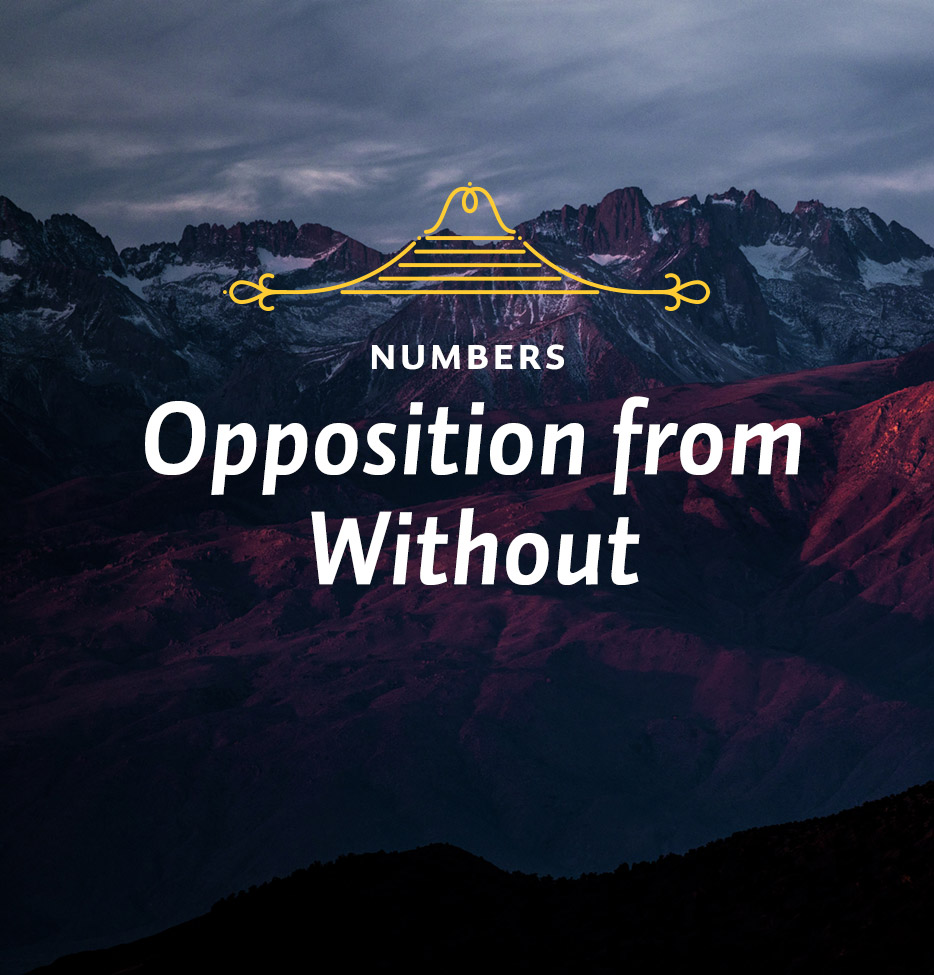From our point of view, the three final oracles (Numbers 24:20-25) are a bit of an anticlimax after speaking of the coming of Jesus. These last three oracles have to do with battles that are in the immediate future. The Israelites are going to defeat the Amalekites (see v. 20), and then the Kenites (see vv. 21-22). The final oracle concerning Kittim, Asshur, and Eber (v. 24) is harder to understand.
In the context of the story, this oracle must have been a great encouragement to the people. A prophecy about a great triumph a thousand years from now is wonderful, but the Israelites have battles to fight now. It was true that the Messiah’s coming was going to be a great blessing to God’s people. But in the meantime, God is working in giving them victory over their enemies.
Until now, these chapters have been somewhat humorous and the prophecies have been promising. But we learn from Revelation 2:14 that, having failed in his attempt to curse the people, Balaam then admonished the king of Moab to simply work from within to undermine the Israelites’ religion.
Then comes this terrible event. The people must have gone outside the camp to have something to do with the Moabites and their religion. But in this instance we see that one Israelite man brought a Midianite woman right into the camp. In delicate language, the text describes this couple having sexual intercourse right alongside or virtually in the precincts of the tabernacle. Phinehas, the son of Eleazar and a grandson of Aaron, rises up to judge them by plunging a spear through the back of the man so that it went out through him and into the woman. By this, a great plague that God had pronounced upon the people was stayed.
Phineas, the grandson of Israel’s first high priest, is praised for it. God honors him in verse 13, saying, “He and his descendants will have a covenant of a lasting priesthood, because he was zealous for the honor of his God and made atonement for the Israelites.” This is a pivotal section in Numbers.
Let me draw a few points of application from the story. The first concerns the sovereignty of God, which we have seen many times already. It is the most dominant, pervasive doctrine in the Bible. Here it emerges in view of Balaam’s and Balak’s attempt to manipulate God to fit their desires. They want to get God to curse the people because that suits them. What we learn from this story is that God is not manipulated. What God determines to do, God does. What happens is what He has determined. Do you believe that? Do you believe it enough to fit in with what God is doing? Or do you, like these people in the story, try to oppose God in His actions?
The second point of application is the faithfulness of God. Balak wanted God to abandon or curse Israel, but God had set His love upon that nation, and He wouldn’t forsake His covenants. This doesn’t mean that God is going to ignore sin among His people, as this judgment on them by the plague shows. But it does mean that God perseveres with us, even when we don’t steadfastly pursue or obey Him. Philippians 1:6 says, “I am persuaded that he who has begun a good work in you will keep on perfecting it until the day of Jesus Christ.” Aren’t you glad our God is like that? If God were not faithful, He would have given up on us long ago. But here you have a God who is faithful to His covenants, and this should be an encouragement to His people.
The third point of application is the sin of loving money. This is not made explicit in the story but it does emerge in references to this story later on in the Bible. There is nothing wrong with money in itself, but Balaam was a man who loved money, and he allowed that to determine what he actually did. As 2 Peter 2 says, he “loved the wages of wickedness,” and people are condemned who, like him, rush for profit into error (see Jude 11). As Jesus said, you can’t serve both God and money.
One of the great problems with American evangelical Christianity is that we are so wrapped up in our material possessions that we really don’t set God or spiritual things first. The more money we have, the greater the danger of depending upon it rather than on God. Many of us have plenty of money, enough to ruin us. Is your love of money holding you back from something God would have you do? Is this something for which you should repent?
Our last point of application is that God is able to use the most unlikely people as channels of His Word to other people. Sometimes we marvel at the fact that God could use the donkey, but the donkey isn’t the surprising thing. The surprising thing is that He could use Balaam. The donkey is just an innocent animal. But Balaam was opposed to God, yet God used him to deliver these oracles, even one that pointed forward to the coming of Jesus Christ.
Now you are not a donkey. You are not even a false prophet. If you belong to Jesus Christ, you’re one of His. If God could use Balaam, certainly he can use you. Are you willing to have Him use you? If you are, isn’t it about time you got busy telling other people about Jesus Christ?






